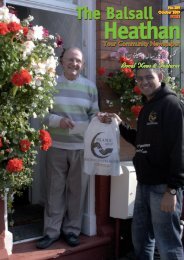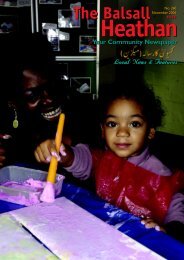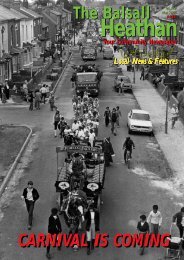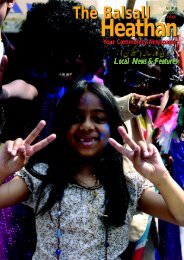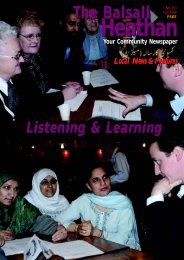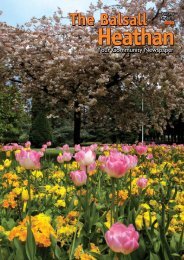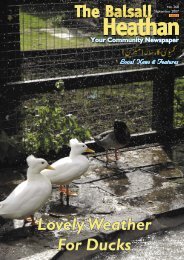Balsall Heathan # 266 Jun 2007 - St. Paul's Community Trust
Balsall Heathan # 266 Jun 2007 - St. Paul's Community Trust
Balsall Heathan # 266 Jun 2007 - St. Paul's Community Trust
Create successful ePaper yourself
Turn your PDF publications into a flip-book with our unique Google optimized e-Paper software.
Are you in a<br />
Mixed Faith<br />
Family?<br />
A New Project in the Warwick<br />
Religions and Education<br />
Research Unit (WRERU) at the<br />
University of Warwick is<br />
Looking for Volunteers<br />
by Elisabeth Arweck<br />
There are little solid statistics on the number of mixed faith or<br />
interfaith marriages, yet every faith community is aware that such<br />
marriages are on the rise, particularly among young adults. Some<br />
evidence of their existence and the issues which arise from religiously<br />
mixed families can be found in web chat rooms where<br />
contributors discuss mixing and meshing traditions in wedding<br />
ceremonies, holiday celebrations, and child-rearing.<br />
Further evidence can be found in the arts, in particular in literature<br />
and drama. For example, Brick Lane, a novel set in the Bangladeshi<br />
Muslim community in East London, shortlisted for the Booker<br />
Prize, is informed by the author’s own dual heritage. Monica Ali<br />
grew up as the child of a Bengali Muslim father—who wished her<br />
to be a ‘good Bengali girl’—and an English mother. Another example<br />
is Child of the Divide, a recent play by Sudha Bhuchar, cofounder<br />
of Tamasha Arts and co-winner of the Asian Women of<br />
Achievement Award in Arts and Culture. The play tells the story of<br />
a small Hindu boy who is taken in by a Muslim family in the chaos<br />
of border crossing between India and the newly formed Pakistan in<br />
1947. Having been brought up a Muslim he eventually finds himself<br />
confronted with his Hindu roots and needs to decide what he<br />
wants to be.<br />
While some people are sceptical and even negative about the mixed<br />
faith background of children who grow up in interfaith families,<br />
others see it as an enrichment, fertile ground for creativity, and fine<br />
examples of successful resolution of conflict. However, there is no<br />
conclusive sociological evidence that children raised with two faiths<br />
are any better or worse off than children raised in a single faith.<br />
Academic research in this area is scant, with some notable exceptions,<br />
such as Abe Ata’s work on Christian/Muslim Intermarriage<br />
on the West Bank and in Australia. Hence the project at the<br />
Univerasity of Warwick. It seeks to investigate how children, whose<br />
parents have different faith backgrounds (Christian, Hindu, Muslim,<br />
or Sikh), form their own religious identity.<br />
The three-year study (<strong>Jun</strong>e 2006–May 2009) is funded by the Arts<br />
and Humanities Research Council. The research team is building<br />
on previous studies of religious nurture in examining the factors,<br />
which influence young people’s religious identity, allegiance,<br />
activities, and beliefs in relation to their parents’.<br />
As many schools have become increasingly diverse in terms of pupils’<br />
ethnic and cultural backgrounds, questions about the role, that<br />
upbringing and teaching play in young people’s religious identity<br />
formation are of great importance. Such questions are all the more<br />
significant given widespread assumptions about the discrete nature<br />
of religious and cultural communities and their related faiths, which<br />
do not allow for the more plural reality of many families and<br />
individuals. Interfaith families are ‘obvious’ examples, which<br />
demonstrate that faith and religious identity do not necessarily<br />
come in neat categories. All this has implications for the way in<br />
which religious education is constructed and taught in schools and<br />
the way in which educators approach individuals from various faith<br />
communities.<br />
The research team would welcome any relevant information and<br />
contact with members of mixed-faith families. Please get in touch!<br />
elisabeth.arweck@warwick.ac.uk<br />
Tel. 02476 528 434<br />
POLICE OFFICERS TEAM<br />
UP WITH AUTO REPAIR<br />
SERVICE TO CRACK CAR<br />
CRIME<br />
By Lori Gillespie<br />
POLICE Officers from <strong>Balsall</strong> Heath neighbourhood are teaming<br />
up with a nationwide auto repair service to provide anti-theft<br />
screws to drivers.<br />
The special screws replace traditional screws in car number plates<br />
to make it extremely difficult for them to be removed.<br />
Number plate theft is becoming a nationwide problem, enabling<br />
criminals to ‘clone’ other cars. Innocent motorists can incur<br />
speeding fines, parking tickets, congestion charges and other<br />
offences as a result. It is hoped that by making the number plates<br />
harder to remove, the chances of becoming a victim of this type of<br />
crime will decrease.<br />
Auto repairers Kwik Fit volunteered their services and fitted the<br />
anti-theft screws for anyone living in the area on 30th May at Aldi<br />
in Sparkbrook for free of charge.<br />
As well as fitting the anti theft screws, motorists were able to pick<br />
up security marking pens to mark valuables in their car, such as<br />
radios and sat nav systems.<br />
PC Christopher Brown, running the initiative, said: “We want to<br />
make it hard for thieves and every crime prevention method taken<br />
is a step towards reducing the chances of becoming a victim.<br />
“Kwik Fit have kindly agreed to support us in this initiative by<br />
fitting the screws while officers gave further crime prevention advice<br />
and literature to those who attended.”<br />
THEFT OF LEAD<br />
The price of scrap metal has rocketed in the last year. As a consequence,<br />
there has been a spate of thefts in the area. Offenders are<br />
stealing the lead from the roof of people’s homes.<br />
Often the victim is not aware of the theft until their roof starts to<br />
leak. There have been a number of reported incidents and there<br />
are possibly many more that have gone unreported or unnoticed<br />
until the winter weather sets in.<br />
If you see anyone acting suspiciously please call Belgrave Road<br />
Police <strong>St</strong>ation on 0845 113 5000 or in the case of an emergency<br />
call 999.



